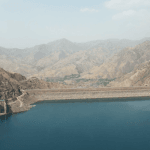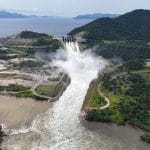PIRAEUS, Greece – Greece’s position as an energy hub that can help the European Union increase its energy security and diversification of supplies, reducing reliance on Russia were highlighted by Commission Vice President for Energy Union Maroš Šefčovič and US Ambassador to Athens Geoffrey Pyatt.
At the Greek Energy Forum at Greece’s biggest port on November 10, the US Ambassador emphasised “the enduring and critically important partnership between the United States in working to advance our shared goals of European energy security”.
“Over the past few years, the United States has made it a priority to work with our European partners and with Greece in particular to develop secure supplies of energy in this region through diversification of energy sources,” Pyatt said.
“Just look where Greece sits, at the geographic nexus of so many of these energy security efforts. Just 30-minutes or so north of Alexandroupolis, the Trans-Adriatic Pipeline (TAP) will connect to the Trans-Anatolian Pipeline (TANAP), allowing gas from Azerbaijan to flow into the European market,” the US ambassador said at the packed library room of the beautiful Laskaridis Foundation building in Piraeus.
He hailed TAP as a “critical piece of the Southern Gas Corridor”. He also noted that Washington “is actively supporting another key link in our joint efforts to move new, non-Russian gas into European markets, that is the Greece-Bulgaria Interconnector (IGB)”.
He explained that the IGB pipeline will provide “a route for new sources of gas – whether from Azerbaijan, US LNG, or elsewhere – to enter a market that has long depended on a single supplier. The Greece-Bulgaria Interconnector will allow new gas to reach not only the countries along the TAP route – Greece, Albania, and Italy – but countries further north, bolstering energy security as far away as Ukraine”.
To maximise the utility of the IGB, a consortium is working with US support in Alexandroupolis to create a floating storage and regasification unit that would serve as a new entry point for LNG into Greece and the Balkans, Pyatt said.
“These projects, as well as the expansion of the Revithoussa LNG terminal here around Attica, are creating the infrastructure to bring new sources of natural gas into Europe, putting greater power in the hands of consumers and diluting the influence of suppliers who have used energy as a tool of political coercion,” he added.
“More importantly, the sources of supply should be balanced, so that European countries will no longer face the prospect of Russia ‘turning off the spigot’ for political purposes,” he said.
“I witnessed this dynamic unfold during my time as Ambassador in Ukraine. There Russia leveraged its position as a monopoly supplier of gas, and by using its ability to turn the tap on or off squeezed the government in Kiev to advance Moscow’s political goals,” the US Ambassador said.
Šefčovič recalled that Europe passed difficult moments “in 2006 and 2009 when suddenly the supplies of gas were interrupted and the crucial decision had to made how are we going to make it to the next week”.
“It’s quite clear that we don’t want and cannot happen again in Europe. For that, we have to make sure that we work together so that we have security of supply, we have diversified sources of external energy supplies and to make sure that we’re so interconnected and so diversified so that we cannot be put in such a difficult situation again,” the European Commission Vice President added.
Šefčovič noted that Greece’s geographical position allows it to become European energy hub.
Pyatt said Washington is eager to see US exporters succeed in marketing LNG from the United States. “But the real winner from these projects will be the consumer, as the European gas market begins to enjoy the benefits of true competition,” he said. “Of course, there is no expectation that US LNG or other sources of gas will entirely supplant Russian supplies. It’s clear that Russian gas will continue to supply a significant percentage of European gas demand. However, it should do so in a competitive market,” the US Ambassador said.
follow on twitter @energyinsider







